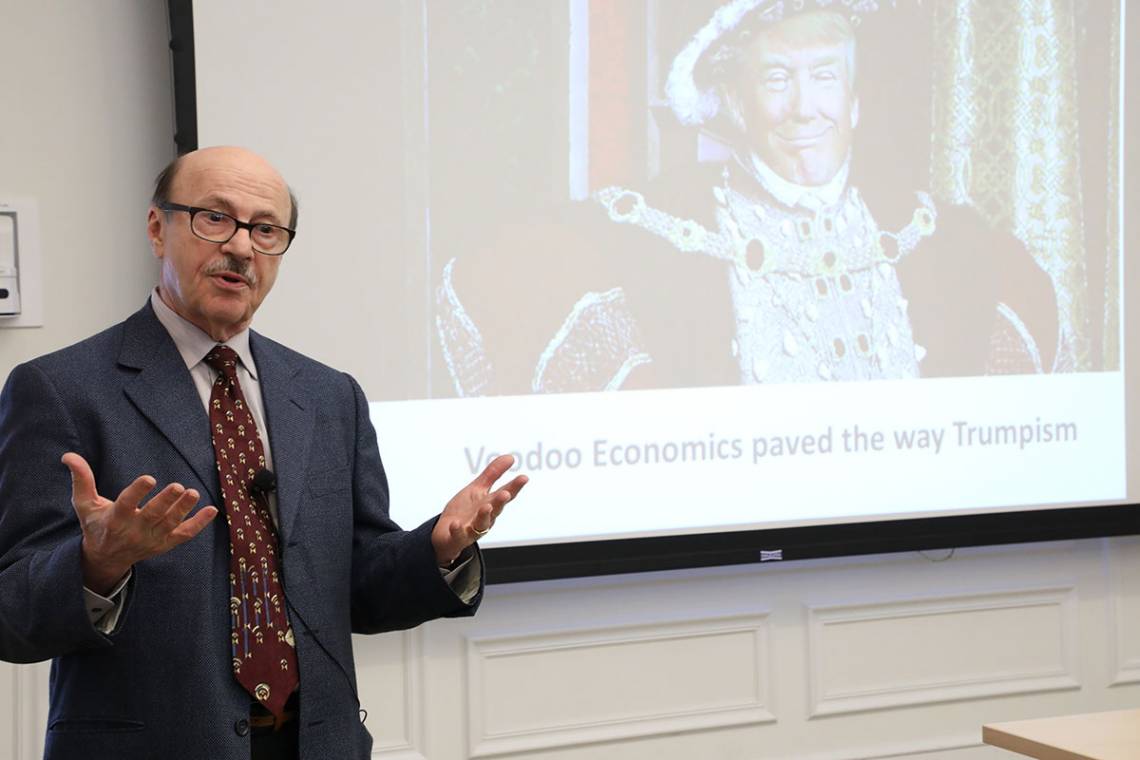The Road to Trump Began With Reaganomics & the Loss of the Middle Class, Economist Says

Donald Trump's rise to the White House can be traced to President Reagan’s economic policies that “hollowed out the middle class.”
That’s according to an economic historian who laid out a slew of sobering data on income, taxes, Chinese imports, debt and more that he connected to across-the-board tax cuts that began in 1980.
“(Reaganomics) paved the way for Trumpism,” John Komlos, a former Duke economics professor and professor emeritus of economics and economic history at the University of Munich, said last week during a talk at the John Hope Franklin Center. “That to me is where our problems started, because it created a great amount of inequality.”
Komlos cited “economic dislocations” in three Rustbelt states as one of the main reasons Trump won over voters who had gone for Barak Obama in 2008 and 2012.
This dislocation includes low and stagnating wages, increasing indebtedness, downward social mobility, declining relative incomes “and the hopelessness accompanying them while at the other end of the income distribution the economy was simply booming.”
“People without a high school diploma, they are really hurting,” Komlos said. “They are the ones that Donald Trump loves. Some people are doing marvelously, and other people are really behind the eight ball. And Trump would not have won otherwise.”
Komlos said he’s met people who support Trump simply for “vengeful reasons.”
“I can understand that; the system didn’t treat them well.”
He cited a three-decade process that started with Reaganomics and its tax cuts, which he says favored the rich by increasing their wealth and political clout. In tax year 1985, for example, he said the top 1 percent gained a $350,000 windfall while the typical household received $3,500, and the poor received a couple of hundred dollars (all in today’s dollars).
Reaganomics also hurt the middle class by crushing unions, he says.
Komlos blamed Democrats, too. Financial deregulation and hyper-globalization under President Clinton accelerated the process of hurting the middle class, according to the economist.
“George Bush Jr. continued to pamper the superrich with his tax policies,” Komlos says. “The process culminated with Barack Obama’s bailing out the super-rich and his disregard of Main Street. This is fermentation for people in despair.”
Komlos said the United States blew an opportunity to drastically restructure its economy and make it fairer when the bottom fell out in 2008-2009.
“The rich and powerful were on their knees, they were bankrupt,” he said. “That’s the only time when you could have really put the economy on a bigger path.”
He added that the taxpayer bailout “was the biggest transfer of wealth from bottom to the top in history of mankind.”
And Komlos said Obama’s choice of Timothy Geithner, a former president of the Federal Reserve Bank of New York, to be his first secretary of the treasury was the “worst decision Obama made in his life.”
“(Geithner) didn’t care about Main Street, he cared about banking,” Komlos said. “Obama is not blameless by any means.”
He noted that Citibank and Bank of America had a combined market value of $24 billion in March 2009. Today they are worth $400 billion.
“The taxpayer didn’t get a cent of the capital gains,” Komlos said.
“We’re in bad shape folks, we’re in much worse shape than we think … because all these problems are not even recognized.”
He added: “Do not blame Hillary’s ‘basket of deplorables’ for heaven’s sake. They are the victims. They did not create the system and they do not understand the system and they are being manipulated in a big way.
“My argument is it’s the economic policies that led to the deplorables, and vengeance on us.”
The John Hope Franklin Center and Duke University Center for International and Global Studies sponsored last week’s talk.